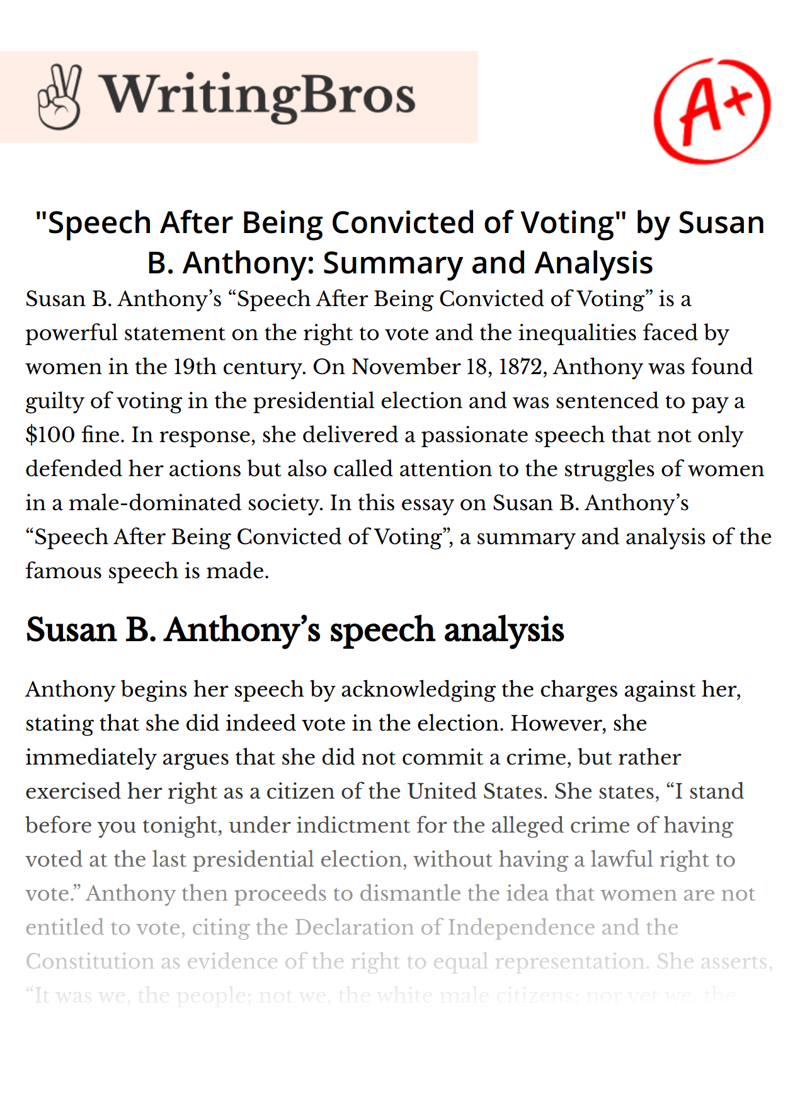"Speech After Being Convicted of Voting" by Susan B. Anthony: Summary and Analysis

Susan B. Anthony’s “Speech After Being Convicted of Voting” is a powerful statement on the right to vote and the inequalities faced by women in the 19th century. On November 18, 1872, Anthony was found guilty of voting in the presidential election and was sentenced to pay a $100 fine. In response, she delivered a passionate speech that not only defended her actions but also called attention to the struggles of women in a male-dominated society. In this essay on Susan B. Anthony’s “Speech After Being Convicted of Voting”, a summary and analysis of the famous speech is made.
Susan B. Anthony’s speech analysis
Anthony begins her speech by acknowledging the charges against her, stating that she did indeed vote in the election. However, she immediately argues that she did not commit a crime, but rather exercised her right as a citizen of the United States. She states, “I stand before you tonight, under indictment for the alleged crime of having voted at the last presidential election, without having a lawful right to vote.”
Anthony then proceeds to dismantle the idea that women are not entitled to vote, citing the Declaration of Independence and the Constitution as evidence of the right to equal representation. She asserts, “It was we, the people; not we, the white male citizens; nor yet we, the male citizens; but we, the whole people, who formed the Union.” Anthony passionately argues that if the government was truly of, by, and for the people, then women should have the same rights as men to vote and participate in the democratic process.
Throughout her speech, Anthony also highlights the hypocrisy of the government and the male-dominated society in which she lived. She notes that women are expected to follow laws and pay taxes, yet are denied the right to vote or have a say in the government that creates those laws and spends those taxes. She states, “There can be no true disfranchisement, no exclusion from any privilege, based upon sex, who shall say that we are not disposed to act justly, to love mercy, and to walk humbly with our God?” Anthony emphasizes the inherent inequality and injustice of a society that denies women the right to vote, despite their contributions to the nation’s progress and well-being.
Anthony’s speech was not only a powerful defense of her actions but also a rallying cry for women’s rights and equality. She was a trailblazer in the women’s suffrage movement, and her words and actions paved the way for future generations of women to fight for their rights and achieve greater equality.
In conclusion, Susan B. Anthony’s “Speech After Being Convicted of Voting” is a landmark statement on the right to vote and the fight for women’s equality. Anthony’s words resonate even today, as women continue to face challenges and inequalities in many areas of life. Her courage and passion serve as an inspiration to all those who believe in the importance of equal representation and the power of democracy.
References
- Anthony, S. B. (1873). Speech after being convicted of voting. Retrieved from https://www.nps.gov/articles/speech-after-being-convicted-of-voting-by-susan-b-anthony.htm
- Dumenil, L. (2011). The modern temper: American culture and society in the 1920s. Hill and Wang.
- Flexner, E. (1959). Century of struggle: The woman's rights movement in the United States. Harvard University Press.
- Gordon, A. D. (1997). The mind of a suffragist: The World of Marjorie Spruill Wheeler. Feminist Studies, 23(2), 331-351.
- Kraditor, A. S. (1965). The ideas of the woman suffrage movement, 1890-1920. Columbia University Press.
Cite this Essay
To export a reference to this article please select a referencing style below

